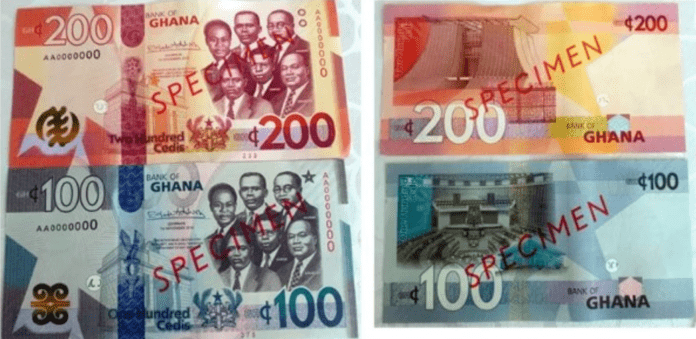The Finance Minister has told Parliament that $8.9 million was spent to print the new ¢100 and ¢200 notes.
Responding to questions on the Floor of Parliament on Tuesday, Ken Ofori-Atta said $5.39 million has already been paid.
“Information obtained from the Bank of Ghana (BoG) shows that the cost of printing the ¢100 and ¢200 notes is $8.97 million.
“This is made up of $4.45 million and ȼ4.53 million for the ¢100 and ¢200 notes respectively. An amount of $5.39 million of the total contract sum has been paid,” the Minister said.
Mr Ofori-Atta told Parliament, from where Joy News’ Joseph Opoku Gakpo reports, that once the BoG finalises its 2019 financial statements, “details of the cost of the currency management will be provided in the bank’s financial statements.”
The central bank introduced the new high-value denominations in November 2019.
According to the Central Bank, the high levels of inflation and the currency depreciation in the past have eroded some of the gains from redenomination, a reason why the new notes were printed.
“The deadweight burden, reflected in high transaction cost has re-emerged. This set of higher denominations will address this increased transaction cost, especially in high-valued transactions in a cash-based economy.
“Also, the structure of the banknote’s denomination has changed resulting in a shift in demand for higher denominations (GH¢50 and GH¢20 accounts for about 70% of the total demand), reflecting the expansion in income and prices.
“Introduction of the higher value denominations in circulation is, therefore, necessary to ensure customer convenience, reduction in the costs of printing and other currency management processes,” the BoG said.
What we were told
The Bank of Ghana’s plan with the new notes was to address the deadweight burden on the economy from past inflation and cedi depreciation.
It also said the structure of the denomination has changed, resulting in a shift in demand for higher denominations.
According to the Central Bank, GH¢50 and GH¢20 notes account for about 70 percent of the total demand of notes.
“Introduction of the higher value denominations in circulation are therefore necessary to ensure customer convenience, reduction in the costs of printing and other currency management processes,” the BoG Governor noted in November 2019.
Minority’s position on the notes
When the new notes were announced, the Minority in Parliament said it would probe the matter if the National Democratic Congress, which its MPs are affiliated to, returns to power.
The Minority said the Bank of Ghana had not been able to give tangible reasons for the introduction of the new denominations.
Former President John Mahama also said the BoG did not go through the right procedure to introduce the new banknotes and that the decision was flawed.
The Minority also claimed the purported failure of the BoG to follow due procedure in introducing the denomination led to some institutions rejecting deposits of the denominations.
In response to the claims, the Bank of Ghana in a statement said it “went through standard processes to introduce the new denominations with integrity as it is to be expected.”

